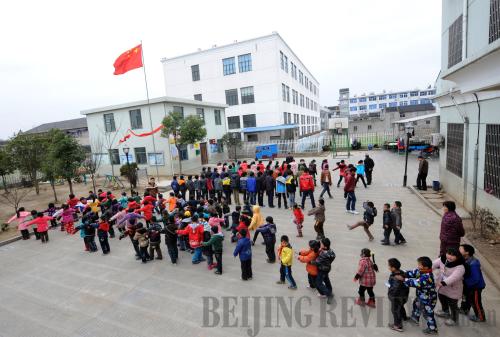|
 |
|
HARD GROWTH: Students take a physical education class at Yucai School in Hangzhou, east China's Zhejiang Province, on February 27. The six-year-old private school for children of migrant workers has yet to be licensed by local education authorities (HAN CHUANHAO) |
In 1993, Zhang Jieting invested more than 100 million yuan ($15.87 million) to establish the Beijing 21st Century Experimental School, when private schools were still a rarity in China. Over the past two decades, he has expanded his business into a group of 30 schools, including one primary school, one middle school, one college and 27 kindergartens.
Despite this growth, Zhang said that he had to continuously overcome hurdles placed in his way by suspicious officials. In fact, Zhang feels the scope for further development of private education has recently become diminished.
For example, Zhang said that there is a gap in government subsidies between public schools and private ones, which makes fair competition impossible. "Current educational policies are limiting, not encouraging, the development of private education," he said.
Zhang, a member of the National Committee of the Chinese People's Political Consultative Conference (CPPCC), China's top advisory body, suggests the government should revamp its policy in a way that allows better support for private schools.
At this year's full sessions of the CPPCC National Committee and the National People's Congress (NPC), China's top legislature, in March, Zhang's call was echoed by many CPPCC National Committee members and NPC deputies.
"The overall importance of and role played by private education are frequently misunderstood. Many people believe private schools are solely for-profit institutions, said Gu Yeli, Vice President of Guangdong University of Foreign Studies. "Such misconceptions have led to more controls and less support for private schools in policy-making."
According to Gu, the priority in terms of reviving private schools should be placed on freeing them from public institutions and allowing them more flexible policies concerning financing.
Since 2003, when the Law on the Promotion of Private Education, which granted equal legal status to privately funded and public education institutions in China, came into effect, private education has become the fastest-growing and most dynamic segment of the country's education system.
According to figures released by the Ministry of Education, more than 120,000 private education institutions had been set up in China by the end of 2010, with 33.9 million registered students. The courses provided by these private education institutions included pre-school, primary, secondary and higher education plus vocational and technical training.
More encouragingly, the overall education and training spending in China has grown at an estimated compound annual growth rate of at least 20 percent since 2008. By 2013, total annual educational spending is projected to increase to 4.1 trillion yuan ($650 billion), of which more than 78 percent, or 3.2 trillion yuan ($507 billion), is expected to be spent on private education, as opposed to public education.
In 2010, the Chinese Government published the National Outline for Medium- and Long-term Education Reform and Development (2010-20), pledging to explore the category management of for-profit and non-profit private schools.
However, the Education Law, which was enacted 16 years ago, and the Law on the Promotion of Private Education, which went into force eight years ago, do not recognize the category of "for profit" in private education. Article 25 of the Education Law states, "Any organization or individual may not establish schools or other educational institutions for the purpose of making profit."
The extent to which investors are able to profit from private schools has also not been clearly defined by law. The Law on Promotion of Private Education, for example, states that after deducting costs, reserving development funds and drawing other necessary expenses in accordance with relevant state regulations, the financers of a private school may obtain a "reasonable" amount of requital from the cash surplus of the school.
"It's time to amend those outdated stipulations," Zhang said.
In order to solve these conflicts, the Ministry of Education is mulling a support policy for private education, according to people with knowledge of the matter.
Current educational policies have been blamed for preventing top teachers from joining private schools. For example, those who work in private education institutions are not eligible for the same benefits, such as insurance, as teachers who work in public schools.
| 